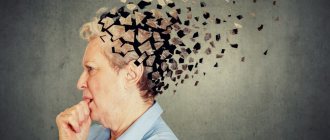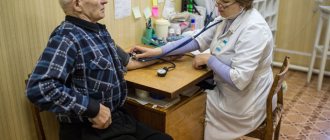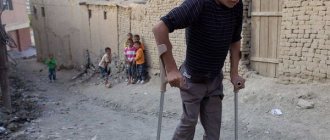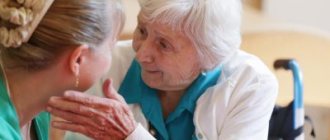Disease Information
Alzheimer's disease gets its name from the German psychiatrist who first described its symptoms in 1901. Moreover, the first mentions of the loss of reason were found in ancient treatises. Currently, there are three theories of the development of the disease:
- cholinergic: degeneration is associated with a decrease in the synthesis of acetylcholine, which is responsible for the transmission of nerve impulses;
- amyloid: disruption of the nervous system occurs against the background of deposition of pathological amyloid protein;
- tau hypothesis: the development of the disease is provoked by a change in the structure of the tau protein, which is responsible for the proper functioning of neurons.
To date, the most likely theory for the development of Alzheimer's disease is amyloid, but research is ongoing.
Make an appointment
Causes
The exact causes of Alzheimer's disease have not yet been clarified. It has been proven that the risk of disease increases significantly:
- with a hereditary predisposition (the disease has been proven to be associated with certain gene mutations);
- for acute and chronic disorders of the blood supply to the brain (stroke, transient ischemic attacks, atherosclerosis, arterial hypertension, etc.);
- against the background of concussions or brain contusions;
- for benign and malignant brain tumors;
- in people suffering from depression, as well as those who have suffered severe psychological trauma;
- against the background of bad habits (smoking, alcohol abuse), as well as acute or chronic intoxication;
- with low intellectual activity throughout life.
Age is one of the main predisposing factors: the older the person, the higher the risk of developing pathology. In addition, women get sick more often than men.
Where can I buy
Folk remedies and ingredients for making them yourself can be bought at the Russian Roots store. The order will be delivered by courier if you live in Moscow or the Moscow region. Products are delivered to other regions of the country by mail.
You can also purchase everything you need in one of the capital’s herbal pharmacies.
Attention! All materials published on our website are protected by copyright. When re-publishing, attribution and a link to the original source are required.
Stages and symptoms
Alzheimer's disease has a long course. It develops gradually and practically does not manifest itself for a long time. As pathological changes increase, symptoms become more noticeable. Doctors distinguish four stages of development of the disease, each of which has its own symptoms.
Predementia
This is the initial stage of Alzheimer's disease, characterized by mild symptoms. Most of them can only be identified through special testing. Over time, the patient and his relatives note:
- deterioration of short-term memory: a person poorly remembers events that happened the day before, while older facts are reproduced perfectly;
- problems with acquiring new knowledge and skills;
- decreased ability to concentrate work;
- difficulty remembering individual words, which does not cause significant discomfort during a conversation;
- general slowness of speech;
- slight deterioration in motor coordination.
Simultaneously with cognitive impairment, apathy begins to develop, which accompanies a person at all stages of Alzheimer's disease.
Since the symptoms are mild, most people are in no hurry to see a doctor, attributing problems to the natural aging process. The stage lasts 7-8 years.
Early dementia
At this stage, short-term memory disorders become clearly visible, and it becomes impossible to attribute them to normal aging. At the same time, the person perfectly remembers events from his youth, any learned facts, and applies old skills. Many patients also develop:
- apraxia: a disorder in performing sequential actions, for example, unbuttoning and fastening buttons, sewing, drawing, etc.;
- agnosia: impaired recognition of objects, can be visual, auditory, olfactory, gustatory or sensitive (tactile), as well as total;
- speech disorders: decreased tempo, poor vocabulary, problems expressing specific thoughts.
The patient can perform simple self-care actions, but complex tasks are no longer possible for him.
Moderate dementia
At this stage of Alzheimer's disease, the patient loses the ability to live independently. He has:
- pronounced agnosia and apraxia;
- paraphasia: speech becomes meaningless because the person chooses words incorrectly;
- dysgraphia and dyslexia: loss of writing and reading skills.
As a result, a person stops performing daily tasks: eating, hygiene procedures, changing clothes. Memory disorders continue to progress, the patient does not remember and does not even recognize close people. Psychiatric symptoms develop:
- emotional instability;
- aggressiveness or tearfulness;
- refusal to accept help;
- vagrancy;
- rave.
The patient at this stage requires constant supervision from relatives, since he may cause harm to himself or others.
Severe dementia
The last stage of Alzheimer's disease inevitably turns a person into a helpless disabled person:
- speech ceases to be coherent, the patient communicates in separate words or short phrases;
- severe apathy develops, at times turning into aggression;
- the ability to perform simple actions is lost;
- control over physiological functions disappears.
Ultimately, the person becomes bedridden, resulting in loss of muscle mass, pneumonia, and bedsores.
Caring for people with Alzheimer's
- Content:
- basic information
- Symptoms of Alzheimer's disease
- Alzheimer's disease according to ICD
- Stages of the disease
- Causes
- At-risk groups
- Difficulties in care
- Therapeutic treatment
- Private boarding houses for Alzheimer's patients
Alzheimer's disease in simple words
is an incurable brain disease characterized by gradual loss of mental abilities. At the final stage, a person loses speech and loses intelligence completely. Without complete and special care, the patient may die.
basic information
Alzheimer's disease is named after Dr. Alois Alzheimer, who first described it in 1906. The causes of the disease have not been fully established. An effective cure for this disease has not yet been invented; the current ones can only alleviate the symptoms. But it is impossible to cure the disease; over time it will progress more and more. There will come a time when the disease develops in such a way that it becomes dangerous to leave a sick person at home alone for various reasons: dangerous to the life and health of the patient himself and those around him.
Those who have ever encountered the manifestations of Alzheimer's disease know that a person with this diagnosis needs constant supervision.
The ideal solution would be for the patient to live in a boarding house for the elderly with Alzheimer's disease, where he will be under round-the-clock supervision of medical specialists.
Symptoms of Alzheimer's disease
One of the very first signs of Alzheimer's disease is memory impairment and a significant decrease in the ability to remember new information. It should be noted that some memory impairment may also be associated with natural age-related changes.
How to recognize Alzheimer's disease? It should be suspected if this sign is observed in combination with the following symptoms:
- Problems with speaking and writing;
- Inability to perform some tasks that were previously daily;
- There are problems solving problems associated with even slight mental stress;
- Apathy, changes in character, alienation from family;
- Problems recognizing places, people (even relatives);
- Inability to reconstruct the sequence of events;
- Changes in visual perception.
It is noteworthy that family and friends are often the first to notice problems associated with dementia. Much earlier than a person experiencing similar changes.
Alzheimer's disease according to ICD
According to the International Classification of Diseases (ICD-10) codes, Alzheimer's disease, depending on its manifestation, distinguishes the following designations:
- G30.0. Early, with the onset of the disease before the age of 65 years;
- G30.1. Late, when the disease manifested itself in patients over 65 years of age;
- G30.8. Other forms of Alzheimer's disease;
- G30.9. Unspecified.
This disease belongs to degenerative diseases of the nervous system.
Stages of the disease
There are several stages of the disease.
- Predementia
At the onset of the disease, a person begins to experience problems with short-term memory. It becomes more and more difficult to master new information. The meanings of some words may be lost in memory. Another thing that should alert you is the inability to concentrate and plan your affairs. Moreover, all these symptoms may be accompanied by apathy, which will forever remain with the patient throughout the illness.
- Early dementia
Memory deteriorates more and more. Speech and perception are also impaired. In this case, the disease may be accompanied by agnosia (problems of visual, auditory, tactile perception). A sick person begins to have difficulty remembering his age and the names of loved ones. Begins to experience difficulties in orientation in space.
Apathy reaches such manifestations that a person even loses hygiene skills, such as brushing teeth, changing clothes, and keeping the body clean. Symptoms also include the appearance of withdrawal, alienation from loved ones, and inability to understand what is read.
- Moderate dementia
In men, unlike women, apathy is often replaced by increased aggression. Symptoms increase, senile dementia becomes more pronounced, and all mental processes are disrupted. The patient does not remember his name or where he lives. People with this diagnosis forget to eat and cannot use electricity, gas, or water correctly. It becomes difficult for them to talk and find words.
- Severe dementia
At this stage, the patient loses the ability to speak. A person can completely lose the ability to move and swallow. The patient loses the ability to feed and care for himself. The patient experiences urinary and fecal incontinence. They will not be able to live without constant care, since even food is served to them in a special way.
Prevention
Alzheimer's disease in most cases affects people whose activities are not related to mental work.
This disease occurs due to the gradual loss of brain function due to cell death and loss of neural connections. But at the same time, the brain’s ability to partially replenish the abilities of damaged parts has been proven.
In people engaged in mental work and various intellectual activities, the brain’s ability to self-regenerate is much higher due to the high number of neural connections. Scientists have established a direct relationship between a person’s level of intelligence and the risk of contracting this disease. If mental abilities are high, the number of brain neural connections is high. This means that the disease is much less common.
It is useful to know or study foreign languages; the more and more varied knowledge a person receives, the lower the risk of getting sick. At the same time, it has been proven that even if the disease has begun, it can be stopped if you engage in some kind of intellectual activity. For example, do crossword puzzles, read and retell what you read. You can learn poetry by heart, master computer knowledge. This will constantly create new neural connections, replacing the old ones lost due to the disease.
As a preventive measure it will be useful:
- lead a healthy lifestyle;
- maintain physical activity;
- balanced diet;
- give up alcoholic drinks.
Japanese doctors have long recommended their elderly patients to solve crossword puzzles, this is a well-known fact. By training the brain, a person prolongs its health. This is the best preventive measure against Alzheimer's disease.
Causes
Today, the causes of Alzheimer's disease have not yet been established. It is known to be associated with amyloid deposits in brain tissue. Amyloid is a collection of misfolded proteins in the brain. This disrupts neural connections. Brain cells die and basic brain functions are lost.
At-risk groups
Risk groups include people with a low level of intelligence, since the number of neural connections is limited. If such connections are lost, the brain will not be able to self-compensate. Also, alcohol abuse leads to the death of brain cells, thereby increasing the risk of developing the disease. Those people whose relatives had Alzheimer's syndrome have a more frequent occurrence of this disease.
Difficulties in care
In the early stages of the disease, the patient may not need special care; he can cope with everyday tasks independently. But over time, the situation will only get worse, given the fact that the disease is incurable.
At a certain point, the patient will no longer be able to cope with even his basic affairs. Then it becomes necessary to have someone nearby at all times. There are people who resort to the help of caregivers; in practice, this is the most expensive care option. There are people who decide to care for their relative themselves. But in this case, it is necessary to leave all your affairs and be with the patient constantly.
The most optimal solution would be to be observed in a boarding house, where there is round-the-clock medical supervision and experience in caring for such patients. The biggest difficulties for loved ones are changes in the patient’s character and behavior. People with this diagnosis tend to distance themselves from their loved ones, become suspicious and are capable of committing acts that alienate them.
There are often cases when the lack of constant supervision at a certain stage of the disease led to the patient leaving home at the moment of insanity.
Therapeutic treatment
Alzheimer's disease cannot be cured. For this reason, treatment is designed to eliminate the manifestation of symptoms.
The main therapeutic goal is to slow down degenerative processes in the brain and reduce their manifestation. As a result of medical research, the following drugs have been identified that can improve the well-being of patients:
- anticholinesterase group;
- medications that prevent glutamate from affecting brain tissue;
- medications aimed at improving cerebral circulation, reducing mental disorders, reducing mental disorders in the stage of late dementia.
Approximately 44 million people on the planet have Alzheimer's syndrome. In Russia, the number of such patients with this diagnosis is estimated at 1.5 million. We must understand that we are talking about the numbers of diagnoses made. It is not known exactly how many people suffer from this disease. Considering such rather large numbers, we can conclude how global this problem is, aggravated by the incurability of the disease.
Don't know how to provide quality care for a loved one?
We will help!
8
In the network of boarding houses "Vita" we guarantee you complete care.
We help with transportation to the boarding house.
We offer
- Accommodation in a room for one, two, three or four guests to choose from.
- Dietary balanced nutrition. Only high-quality and fresh products.
- Games, sports, outdoor walks, concerts and much more.
- Monitoring your well-being and taking medications prescribed by your doctor.
- Full medical care and health monitoring 24 hours a day (accompaniment, assistance in eating, carrying out hygiene procedures).
- Providing specialized equipment and technical care.
- Regular change of bed linen, washing of clothes.
- Assistance in carrying out hygiene procedures.
- Optimal price-quality ratio for you and your loved ones.
Diagnostics
Diagnosis of Alzheimer's disease and determination of its stage are carried out by doctors from the Neurology Department and psychiatrists. The set of examinations includes:
- survey and collection of complaints;
- studying the history of the disease (when the first problems appeared, how quickly they grew, etc.);
- assessment of life history: previous and existing diseases, injuries, hereditary factors;
- detailed neurological examination;
- laboratory diagnostics: general blood and urine analysis;
- biochemical blood test: glucose level, lipid spectrum, coagulation indicators, etc.;
- examination of cerebrospinal fluid to detect beta-amyloid (one of the specific signs of Alzheimer's disease);
- electroencephalography;
One of the main methods for diagnosing Alzheimer's disease is neuropsychological tests to assess cognitive impairment:
- name the objects shown in the picture;
- remember 5 unrelated words, repeat them immediately and after 3 minutes;
- distribute words into categories (food, animals, furniture, etc.);
- perform simple arithmetic operations;
- draw a clock showing a specific time;
- draw a picture or write a sentence from dictation.
If necessary, additional consultations and examinations are prescribed.
Treatment of Alzheimer's disease
Treatment is aimed at slowing the progression of the pathology. Doctors use drugs from various groups to improve the functioning of the central nervous system and relieve the main symptoms:
- anticholinesterase drugs aimed at improving memory (donepezil, reminil and others);
- memantine, which slows the progression of dystrophy and reduces the severity of symptoms (the only drug approved by WHO for the treatment of Alzheimer's disease);
- drugs to improve metabolism in brain cells (mexidol, vinpocetine, pentoxifylline);
- nootropics (Cerebrolysin, Actovegin) to stimulate the formation of additional connections between nerve cells;
- symptomatic drugs: antidepressants, antipsychotics, anxiolytics, etc.
The combination of drugs, their dosage, frequency and duration of administration is selected by the doctor on an individual basis. Often, the drug regimen is adjusted during treatment to achieve an optimal result with a minimum number of side effects.
Various psychotherapeutic techniques are used as a complement to drug treatment. They help reduce aggression and anxiety, improve the quality of thinking and stimulate memory. A good effect is provided by:
- art therapy: improves the emotional state of the patient, reduces the level of anxiety and depression, reduces aggression;
- sensory room activities and sensory integration;
- reminiscence therapy (used for severe dementia, helps to set the patient in a positive mood).
Simultaneously with the therapy, relatives are trained in the rules of behavior with the patient and caring for him. To maintain a stable patient's condition it is necessary:
- organize a clear and unchanging daily routine;
- try to maintain a person’s autonomy and independence;
- do not discuss medical problems among themselves in the presence of the patient;
- maintain a friendly atmosphere in the family;
- avoid conflicts and disputes.
If necessary, family members also work with a psychologist, since constant communication with the patient requires significant mental stress.
Make an appointment
What to do if delusions and hallucinations occur?
Delusions are those false beliefs that are dictated to the patient by his damaged brain. They can be dictated by paranoia, hallucinations, depression, etc. Often, inadequate beliefs save the patient from fear, anxiety, and a feeling of loss of connection with reality. Hallucinations push an elderly person to communicate with dead or non-existent people, images on TV, etc. In this case it is recommended:
- Agree with the patient, use “holy lies”, do not argue. It is impossible to return a person with Alzheimer's to reality.
- Calm the patient if he is frightened by his own hallucination. Patting him on the head and holding him close like a child who has no life experience.
- Speak softly and calmly, without showing aggression. In this case, it is not the person himself who speaks, but his illness.
- Distract the patient from his visions, point to really existing objects (people).
- Don't be manipulated. People with crazy ideas know how to get what they want.
- Do not scold the patient if he gets lost. Your loved one really doesn’t know what’s going on.
- Tell your doctor about all manifestations of hallucinatory delusions.
Prevention
A set of measures to prevent Alzheimer's disease is relevant for all people. It reduces the risk of developing the disease in healthy people and reduces the rate of its progression in patients. Doctors recommend:
- observe the work and rest schedule, avoid chronic stress and overwork;
- avoid physical inactivity, regularly give the body moderate physical activity (hiking, swimming, cycling);
- Avoid drinking alcohol and smoking;
- keep blood pressure, blood glucose, cholesterol levels under control;
- eat right: the diet should contain a sufficient amount of proteins, fats and carbohydrates, as well as microelements; It is advisable that the menu regularly include fatty sea fish, olives and olive oil, whole grain bread, nuts, spinach, and fruits;
- provide a load for the brain: solve crosswords, learn poetry, read classical literature, play chess, etc.;
- be regularly examined by a doctor.
Causes of the disease
According to statistics, symptoms of Alzheimer's disease develop in 5-8 people per 1000 population. Every second case of dementia is caused by this particular pathology. In the last decade, there has been an increase in incidence, but doctors still find it difficult to name the exact causes of neurodegenerative processes. Increased risks have been proven in the age group over 65 years of age. After 95 years, almost 70% of older people develop characteristic symptoms. Women are affected more often than men, but this may be due to their longer life expectancy, especially in European countries.
Most experts agree that the main factor that triggers neurodegenerative processes is the natural aging of the body. Slowing metabolic processes contributes to the accumulation of amyloids.
Genetic studies have proven a hereditary predisposition to Alzheimer's disease. Mutations in several chromosomes lead to disruption of protein metabolism in cerebral tissues. Genetics most often causes the early onset of the disease, when the first signs of dementia appear at the age of 30-40 years.
The following factors can accelerate the development of pathology:
- Poor nutrition.
- Living in areas with poor ecology.
- Bad habits.
- Poisoning with chemicals, heavy metals.
- Chronic stress.
- Past neuroinfections: meningitis, encephalitis.
- Brain tumors.
Treatment at the Energy of Health clinic
If your relative begins to suffer from memory impairment, do not blame everything on age. Doctors at the Health Energy clinic will evaluate his condition and conduct all the necessary examinations to identify signs of Alzheimer's disease. Modern treatment methods are at your service:
- drug therapy in accordance with WHO recommendations and the individual characteristics of the patient’s body;
- work with a psychologist and psychotherapist;
- treatment of concomitant diseases;
- training relatives in the rules of caring for the sick;
- comprehensive recommendations on preventive measures, nutritional and lifestyle corrections;
- organization of consultations with foreign specialists and sanatorium-resort treatment if indicated.
Advantages of the clinic
The modern multidisciplinary medical facility is equipped in accordance with international standards. We offer each patient:
- screening and targeted diagnostic programs to assess health status and identify hidden pathologies;
- detailed diagnostics in accordance with complaints;
- consultations with qualified specialists;
- modern treatment methods, including drug therapy, physiotherapy, exercise therapy and massage;
- help from psychotherapists;
- organization of sanatorium-resort treatment;
- own day hospital for course treatment.
Don't wait until Alzheimer's changes the lives of everyone in your family. Sign up for the Energy of Health clinic for diagnosis and selection of treatment at the first alarming signs, or come to check-up screening programs.









